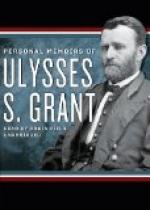Our loss in this engagement was: McPherson, 37 killed, 228 wounded; Sherman, 4 killed and 21 wounded and missing. The enemy lost 845 killed, wounded and captured. Seventeen guns fell into our hands, and the enemy destroyed by fire their store-houses, containing a large amount of commissary stores.
On this day Blair reached New Auburn and joined McClernand’s 4th division. He had with him two hundred wagons loaded with rations, the only commissary supplies received during the entire campaign.
I slept that night in the room that Johnston was said to have occupied the night before.
About four in the afternoon I sent for the corps commanders and directed the dispositions to be made of their troops. Sherman was to remain in Jackson until he destroyed that place as a railroad centre, and manufacturing city of military supplies. He did the work most effectually. Sherman and I went together into a manufactory which had not ceased work on account of the battle nor for the entrance of Yankee troops. Our presence did not seem to attract the attention of either the manager or the operatives, most of whom were girls. We looked on for a while to see the tent cloth which they were making roll out of the looms, with “C. S. A.” woven in each bolt. There was an immense amount of cotton, in bales, stacked outside. Finally I told Sherman I thought they had done work enough. The operatives were told they could leave and take with them what cloth they could carry. In a few minutes cotton and factory were in a blaze. The proprietor visited Washington while I was President to get his pay for this property, claiming that it was private. He asked me to give him a statement of the fact that his property had been destroyed by National troops, so that he might use it with Congress where he was pressing, or proposed to press, his claim. I declined.




